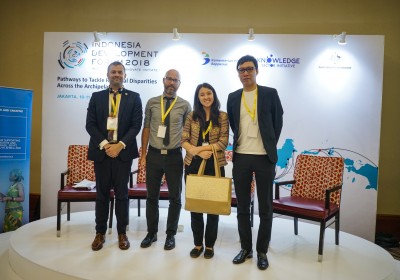Social Entrepreneurship, an Opportunity for Youth to Earn IDR 19.4 Billion
May 13, 2019
CEO of Du'Anyam, Azalea Ayuningtyas (second from the right), after presenting her material at the Indonesia Development Forum 2018.
Within the last five years, social entrepreneurship in Indonesia has grown in the field of creative industry, agriculture, and education. Based on the research from the United Nations Economic and Social Commission for Asia and the Pacific (UNESCAP) and the British Council, there were more than 80 well-established social enterprises in 2017, significantly more than the previous five years, which recorded only 10 in this sector. Three of the most attractive areas in the social enterprise sector are creative industry (22 percent), agriculture and fisheries (16 percent), and education (15 percent).
Unlike other businesses, social entrepreneurship opens the opportunity to be inclusive and equal, as their core is business, but with a touch of social mission. Social entrepreneurship works with marginalized communities and minority groups like women and people with disabilities.
“The way the social entrepreneurship works becomes a solution to address poverty and distribute unequal wealth in Indonesia,” said the Minister of National Development Planning/Head of National Development Planning Agency (Bappenas), Bambang Brodjonegoro, cited from his welcoming speech on the publication of Developing an Inclusive and Creative Economy: The State of Social Enterprise in Indonesia, jointly published by the British Council and UNESCAP in 2019.
Recently, stated Bambang, social entrepreneurs are not only reaching major cities, but also operating in rural areas. Due to increasingly open access and connection from remote areas in Indonesia, the people’s economic potential and creativity continue to increase. Social entrepreneurs can provide a significant impact to the development of the nation’s economy by granting access to basic needs, such as energy, education, and sustainable food, and empowering minority groups.
Social enterprises also help the government create equal job opportunity. Data from British Council shows that the leadership of social enterprises are dominated by Indonesian young people (18-34 years), in 67 percent of the total 342 thousand existing social enterprises. Also, 40 percent of the total social enterprises in Indonesia are led by women.
The social enterprise sector has also provided a significant contribution in opening the path for women, as 69 percent of workers in this sector are women. As a result, social enterprises contribute to an astonishing 99 percent female worker increase in 2016-2017, compared to previous years.
One of the social enterprises initiated by young women and have empowered housewives is Du’Anyam. This business empowers housewives in Flores, East Nusa Tenggara, and was initiated by three young women, namely Azalea Ayuningtyas, Melia Winata, and Hanna Keraf. They are successful in improving household economy through lontar leaf weaving and making women more equal to their husbands.
Read: https://indonesiadevelopmentforum.com/2019/ideas/4621-duanyam-menjalin-tradisi-berdayakan-perempuan-timur
Another example of a community-based social enterprise is Warung Pintar. This social enterprise emerged from its founder’s concern when looking at how traditional mom and pop stalls are losing to modern retail shops. Warung Pintar (or Smart Shop in English) recruits a number of traditional small shops and turn them into technology-based stalls with two pillars, namely Internet of Things (IoT/Internet untuk Segala) and Big Data Analytics (Analisis Mahadata). Ultimately, partners receive daily sales earning of IDR 300,000 – 500,000.
Read: https://indonesiadevelopmentforum.com/2018/article/9278-warung-pintar-bersaing-dengan-retail-modern
“The success of these social enterprises contribute in improving Indonesia’s Gross Domestic Product by around 1.91 percent, or IDR 19.4 Billion,” explained Minister Bambang.
Head of Bappenas, Bambang Brodjonegoro, recognized that social entrepreneurship has successfully placed inclusiveness as the core of economic development. This sector provides the same platform for rural and urban areas, making both of these areas collaborate to create creative products.
Looking at the potential of social entrepreneurship for inclusive job creation, Bappenas encourages ideas or thoughts from multi-parties through the Indonesia Development Forum (IDF) 2019. This international conference highlighting the theme of “Mission Possible: Seizing the Opportunities of Future Work to Drive Inclusive Growth” has a sub-theme on mentoring social entrepreneur actors.
“A lot of youth are interested in becoming entrepreneurs. It will be much more perfect if this business is linked to social entrepreneurship,” said Minister Bambang during IDF 2019 launching, last Tuesday, January 29, 2019, in Jakarta.
This forum was held by Bappenas and supported by the Australian Government through Knowledge Sector Initiative. This program convenes development stakeholders to formulate policies based on research data and good practices. Examples of good social entrepreneurship practices can be submitted through papers, short presentations, articles, videos, or infographics, to demonstrate new products and services that can empower and inspire the people in IDF 2019. **
Indonesia’s Research Institutions Supporting the Development of the Electric Vehicle Industry
Indonesian Muslim Fashion and Cosmetics IKMs Shine at Dubai World Expo 2020
Govt Steps Up UMKM Transformation Efforts in the Midst of Pandemic Slowdown
Govt Encourages Promotion of IKM Products in Digital Era
Government Begins Developing Maritime Training Center in Makassar
Tweets by IDDevForum
